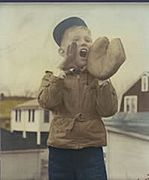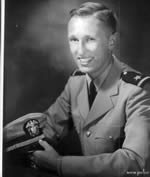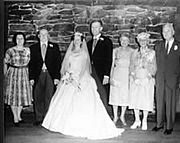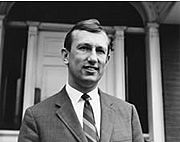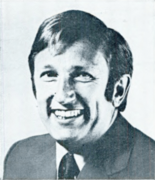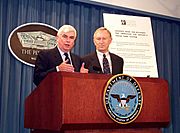Jim Jeffords facts for kids
Quick facts for kids
Jim Jeffords
|
|
|---|---|
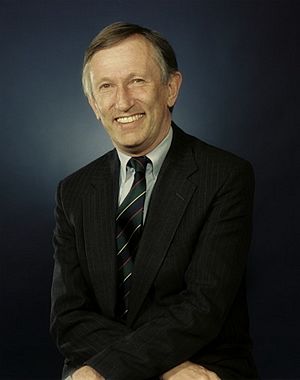 |
|
| United States Senator from Vermont |
|
| In office January 3, 1989 – January 3, 2007 |
|
| Preceded by | Robert Stafford |
| Succeeded by | Bernie Sanders |
| Chair of the Senate Environment and Public Works Committee | |
| In office June 6, 2001 – January 3, 2003 |
|
| Preceded by | Bob Smith |
| Succeeded by | Jim Inhofe |
| Chair of the Senate Health, Education, Labor and Pensions Committee | |
| In office January 20, 2001 – June 6, 2001 |
|
| Preceded by | Ted Kennedy |
| Succeeded by | Ted Kennedy |
| In office January 3, 1997 – January 3, 2001 |
|
| Preceded by | Nancy Kassebaum |
| Succeeded by | Ted Kennedy |
| Member of the U.S. House of Representatives from Vermont's at-large district |
|
| In office January 3, 1975 – January 3, 1989 |
|
| Preceded by | Richard W. Mallary |
| Succeeded by | Peter Plympton Smith |
| 20th Attorney General of Vermont | |
| In office January 9, 1969 – January 3, 1973 |
|
| Governor | Deane C. Davis |
| Preceded by | James L. Oakes |
| Succeeded by | Kimberly B. Cheney |
| Member of the Vermont Senate from Rutland County | |
| In office January 4, 1967 – January 8, 1969 Serving with George W. F. Cook, Andrew L. Orzel, Ellery R. Purdy
|
|
| Preceded by | George W. F. Cook, Ellery R. Purdy, William J. Burke |
| Succeeded by | Andrew Orzel, Ellery R. Purdy, Sanborn Partridge, Robert E. West |
| Personal details | |
| Born |
James Merrill Jeffords
May 11, 1934 Rutland, Vermont, U.S. |
| Died | August 18, 2014 (aged 80) Washington, D.C., U.S. |
| Political party | Republican (before 2001) Independent (2001–2014) |
| Spouses |
Liz Daley
(m. 1961; div. 1978)
(m. 1986; died 2007) |
| Children | 2 |
| Relatives | Olin M. Jeffords (father) |
| Education | Yale University (BS) Harvard University (JD) |
| Signature | |
| Military service | |
| Allegiance | |
| Branch/service | |
| Years of service | 1956–1959 (active) 1959–1990 (Navy Reserve) |
| Rank | |
| Unit | USS McNair |
| Battles/wars | 1956 Suez Crisis 1958 Lebanon crisis |
James Merrill Jeffords (May 11, 1934 – August 18, 2014) was an American lawyer and politician. He served as a U.S. Senator for Vermont. He was first elected to the Senate in 1989 as a Republican. In 2001, he made a big change by leaving the Republican Party. He became an independent and worked with the Democrats.
Before becoming a U.S. Senator, Jeffords was a U.S. Representative for Vermont. He served in the House from 1975 to 1989. He retired from the Senate in 2007. His father, Olin M. Jeffords, was a Chief Justice of the Vermont Supreme Court. Jim Jeffords was born in Rutland, Vermont. He went to Yale University and served in the United States Navy. Later, he earned a law degree from Harvard Law School. He practiced law and was active in local politics in Shrewsbury. He served in the Vermont Senate and as Attorney General of Vermont.
Contents
Early Life and Education
Jim Jeffords was born in Rutland, Vermont. His father, Olin M. Jeffords, was a very important judge. He was the Chief Justice of the Vermont Supreme Court. Jim went to public schools in Rutland. He graduated from Rutland High School in 1952. In 1956, he earned a degree in industrial administration from Yale University.
Military Service
While in college, Jeffords was part of the Reserve Officers' Training Corps. After graduating, he joined the United States Navy. He became a surface warfare officer. He served on the ship USS McNair. He was on the McNair when it was the first ship to enter the Suez Canal after the 1956 Suez Crisis. He also helped during the 1958 Lebanon crisis. After three years of active duty, Jeffords continued to serve in the United States Navy Reserve. He retired as a captain in 1990.
Law Career and Family Life
After his time in the Navy, Jeffords went to Harvard Law School. He graduated in 1962. For a year, he worked as a law clerk for a judge. He lived in Shrewsbury for a long time. He worked as a lawyer in Rutland. He also became very involved in local politics as a Republican. He held several local government roles in Shrewsbury.
Jim Jeffords married Elizabeth "Liz" Daley twice. Their first marriage ended in 1978. They married again in 1986. Liz Jeffords passed away in 2007 after battling ovarian cancer. Jim and Liz had two children, Leonard and Laura. Both of their children live and work in the Washington, D.C., area. After his wife's death, Jeffords moved to Washington, D.C., to be closer to his children.
Political Journey
Starting in Vermont Politics
Jim Jeffords began his political career in Vermont. In 1966, he won a seat in the Vermont Senate. He served there from 1967 to 1969. During this time, he worked on important committees. After that, in 1968, he was elected as the Attorney General of Vermont. This job meant he was the state's chief lawyer. In 1972, he was a Presidential Elector for Vermont. He voted for Richard Nixon to be president again.
In 1972, Jeffords tried to become the Republican candidate for governor. However, he did not win the primary election.
Serving in the U.S. House of Representatives
In 1974, Jim Jeffords won the election for Vermont's only seat in the United States House of Representatives. He served in the House for 14 years. In the House, he was part of the Agriculture and Education and Labor Committees. He became a top Republican member on the Education and Labor Committee.
Jeffords was known as a "moderate-to-liberal Republican." This meant he often held views that were more common among Democrats. For example, he was the only Republican to vote against President Ronald Reagan's tax cuts in 1981. He also supported more protections for the rights of gay and lesbian people. He was also known for his strong support for the environment and the National Endowment for the Arts.
Becoming a U.S. Senator
In 1988, Jeffords was elected to the United States Senate. He was reelected in 1994 and 2000. He served in the Senate until 2007.
Jeffords believed that more people should have access to health care. He supported President Bill Clinton's health care plan in the 1990s. In 1999, he was one of only five Republican senators who voted to clear President Clinton after he was impeached. He also voted for the Comprehensive Test Ban Treaty. This treaty aimed to stop underground nuclear testing.
In Congress, Jeffords focused on laws about education, job training, and helping people with disabilities. Later in his Senate career, he worked on important environmental laws. He also helped convince the U.S. government to send help to Rwanda during the Rwandan genocide. Lieutenant-General Roméo Dallaire, who led the UN mission there, thanked Jeffords for his efforts.
Jeffords helped start the Congressional Solar Coalition and the Congressional Arts Caucus. He received awards for his work, like the "Legislator of the Year" award from Parenting magazine. The Sierra Club, an environmental group, also gave him its highest award. During his time in the Senate, Jeffords sat at the Candy Desk, a fun tradition where a senator keeps candy for others.
-
Jim Jeffords (right) with fellow U.S. Senator Chris Dodd at the Pentagon in May 2000. They were talking about defense issues.
Leaving the Republican Party
On May 24, 2001, Jim Jeffords made a very important decision. He decided to leave the Republican Party and become an independent. He said he would work with the Democrats for how the Senate was organized. He explained that he disagreed with the policies of President George W. Bush, especially about the large tax cuts. He also felt that Senate Republicans were not fully funding a law that helps people with disabilities.
At that time, the Senate was split 50-50 between Republicans and Democrats. This meant that the Vice President, who was a Republican, could break any tie votes. Democrats were looking for a Republican to switch parties so they could gain control. Jeffords' switch was historic because it changed which party was in charge of the Senate. This had never happened before because of one senator switching parties.
Jeffords agreed to vote with the Democrats on most procedural matters. In return, he was given the chairmanship of the Senate Environment and Public Works Committee. He had to give up his chairmanship of the Health, Education, Labor, and Pensions Committee. Even though he was free to vote as he wished on policy, he often voted with the Democrats.
Jeffords was only the second Senator from Vermont to work with the Democrats. Before him, the Senate seat he held had been held by a Republican since 1857.
Key Votes and Positions
Even before he switched parties, Jim Jeffords' voting record was considered moderate to liberal. This was common for Republicans from Vermont. He often voted differently from many other Republicans. For example, in 1981, he was the only Republican in the House to vote against a bill that cut the top tax rate. This was a major part of President Ronald Reagan's plans.
During his time in the Senate, he voted for:
- The Brady Handgun Violence Prevention Act, which required background checks for gun purchases.
- The Family and Medical Leave Act of 1993, which allowed workers to take unpaid leave for family or medical reasons.
- Ending the "Don't ask, don't tell" policy, which banned openly gay people from serving in the military.
He voted against:
- Giving permanent normal trade relations with China.
- Banning affirmative action at the federal level.
Jeffords also spoke out against the nomination of Clarence Thomas to the Supreme Court of the United States. He was one of only two Republicans to vote against confirming him. In 1993, he was the only major Republican to support President Clinton's plan to create a national health care system. His views on environmental issues also set him apart from many of his Republican colleagues.
On some issues, his record was mixed. For example, on guns, he voted for the Brady Bill and the Federal Assault Weapons Ban. However, he also voted against background checks at gun shows in 1999. He took a more moderate stance on the death penalty.
On many economic issues, Jeffords often agreed with the Republican Party. He supported free-trade agreements. He voted for stricter bankruptcy rules and a balanced budget amendment. Even after becoming an independent, he often voted with Republicans on major laws. For example, he voted against the Bipartisan Patient Protection Act. Two years later, he voted for a prescription drug bill, which was supported by President George W. Bush.
In 2002, Jeffords was one of only 23 senators to vote against allowing the use of military force in Iraq. Soon after, he was one of only nine senators to vote against creating the United States Department of Homeland Security.
Retirement and Passing
In April 2005, Jim Jeffords, who was 70 years old, decided not to run for reelection in 2006. He said his wife's cancer and his own health concerns led to his decision to retire. On September 27, 2006, Jeffords gave his farewell speech in the Senate. After his retirement, Bernie Sanders, an independent who works with the Democratic Party, took his place in the U.S. Senate.
Jim Jeffords passed away on August 18, 2014, from complications related to Alzheimer's disease. He was 80 years old. He was buried in Northam Cemetery in North Shrewsbury, Vermont.
See also
 In Spanish: Jim Jeffords para niños
In Spanish: Jim Jeffords para niños
- List of American politicians who switched parties in office
- List of United States senators who switched parties
- The Singing Senators
 | May Edward Chinn |
 | Rebecca Cole |
 | Alexa Canady |
 | Dorothy Lavinia Brown |


